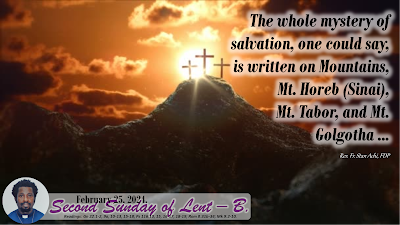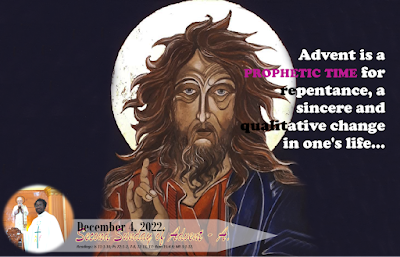MOUNTAIN OF REVELATION, MOUNTAIN OF FAITHFULNESS.
February 25, 2024.
Second Sunday of Lent – B.
“Jesus took Peter, James, and John and led them up a high
mountain apart by themselves.” Mk 9:2
A Chinese proverb says: “You must climb the mountain if you
would see the plain.” An Ivorian proverb adds: “If a frog leaves the swamp for
the mountains, it means it is in danger.”
We are today, the second week of our forty days' pilgrimage,
and the liturgy emphasizes the reality of faith. We are urged to make room for
faithfulness to God through listening to his voice and obeying his
commandments. And beautiful, all these calls for faithfulness happen on the top
of Mountains because the high places, the mountains stand as places of
encounter with the Lord.
After that of the desert last Sunday as a place of intimacy,
prayer, and faithfulness, we are taken today to another place of encounter, the
mountains. It is said that Mountains have a logical religious symbolism for
Jewish and Christian cultures since they are “closer to God” who dwells in the
heavens. Mountains are mentioned frequently in the Bible. God often reveals
himself on a mountaintop in the Holy Scriptures. Every time that the Lord wanted
to speak to his people or make a new covenant with them, he called them on a
mountain. In that sense, many high places or mountains have a significant
impact on the people and their beliefs and relationships with the Lord. Mount
Sinai is the place where Moses received the gift of the law, the Ten
Commandments, and the constitution of Israel as people of God. It is also the
place where the great prophets, such as Elijah, encountered the Lord. In
Matthew’s Gospel, Jesus delivers the Beatitudes on a Mountain, thus the
calling, sermon of the Mount, conjuring an image of Moses who received the Ten
Commandments on Mount Sinai.
So, from the Old to the New Testament, the mountain has a
significant impact on the relationship between God and his people. And the whole
mystery of salvation, one could say, is written on Mountains, Mt. Horeb
(Sinai), Mt. Tabor, and Mt. Golgotha.
In today's first reading, in the event of the Abrahamic
sacrifice of his Son Isaac, the mountain holds also a stand. The Lord asked
Abraham to go to the mountain he himself would show him, and there, offer his
son Isaac, the son of the covenant, in sacrifice to him. On this mountain,
Abraham's faith is put to test, and God seeing his faith will make a covenant
with Abraham. Abraham is promised a blessing of numerous generations and
countless descendants. Thus, Abraham became the father of all believers, our
father in faith. The Mount stands here as a place of sacrifice, covenant, and
faithfulness.
In the New Testament, another very significant mountain
scene is the Transfiguration of Jesus, the episode of today's Gospel. We have a
narrative in Matthew and also with Mark. Jesus appears with Moses and Elijah,
who themselves encountered God on the mountaintop in the Old Testament. The
Transfiguration is the moment when the disciples encounter God through Jesus,
and Jesus, in turn, is seen as the fulfillment of the law (Moses) and the
prophets (Elijah). It could be described as the event of three mountains: Sinai
(Moses and Elijah) or the Law and the Prophets, Tabor (Jesus), and finally, the
third mountain, the one our attention is called to focus on most, especially in
this season of Lent, the Calvary, where Jesus will bear the sins of all mankind
on the cross, so that whoever believes in him would have eternal life. In this
singularly significant event of Jesus' life that is the Transfiguration, not
only is the Lord's identity made manifest, but an order and a new commandment
is given: “This is my beloved Son. Listen to him.” It is the divine order to listen
to the Lord.
Lent is an excellent time for us to encounter the Lord. It
is also the best time to hear his voice and listen to it, to abide by his
words. We live in a world filled with so many cacophonies and deafening rumors
that we often fail to listen or we no longer know how to listen and what to
listen to. The call is addressed to you and me today. Like Peter, John, and
James, we are invited to let ourselves be led up to the mountain of our
intimacy with the Lord, to open the ears of our hearts, and to feel the Lord
who is speaking to us. He speaks words of love, faith, obedience to God's will,
and most especially of sacrifice.
Just as in his conversation with Moses and Elijah, Jesus
spoke of his soon-coming passion, death, and resurrection, the supreme sacrifice
of love, so too, we are pressed to face all our trials and tribulations as a
contribution to the sacrifice of love. Only then we will be able to enter into
a new covenant with the Lord.
St. Paul tells us God did not spare his Son. He offered him as a sacrifice of expiation for our sins. So, we too will not be spared. Like Jesus and with Jesus, we will suffer. "However, If God is for us, who can be against us?" Great assurance. Nothing will ever harm us if we keep our faith deeply rooted in the Lord. In our daily lives, after times of trials and temptations, we should see mountains as the best places of God's revelation and of our faithfulness or obedience to his will.





Comments
Post a Comment